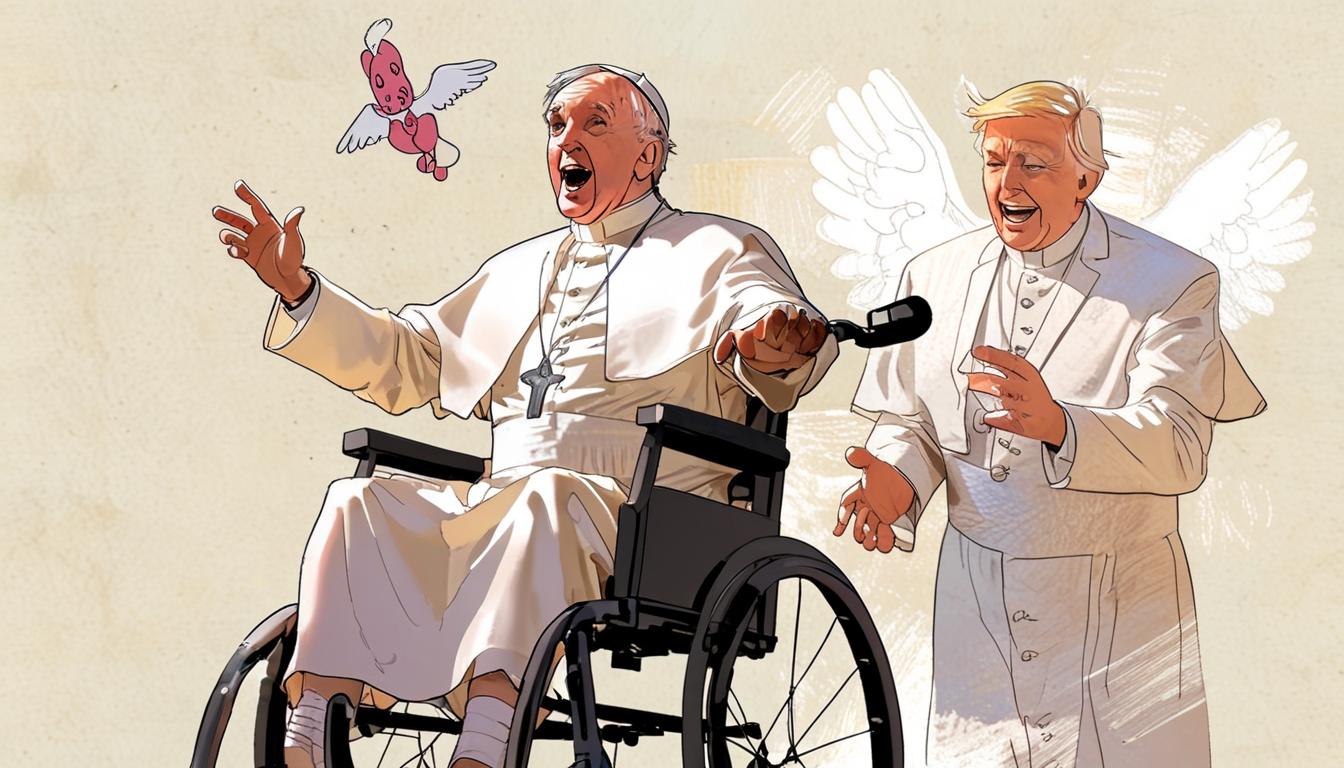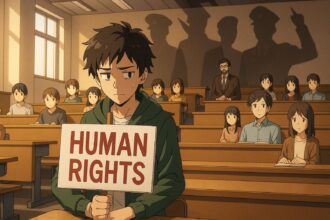As the world honours Pope Francis at his funeral, their contrasting Easter messages reveal profound differences in leadership, values, and approach to global issues between the late pontiff and President Donald Trump.
As the world prepares to honour Pope Francis in a solemn funeral at St. Peter’s Square, a striking contrast emerges between the late pontiff’s legacy and President Donald Trump’s recent public statements. The Easter messages from both leaders, delivered just hours apart, underscore profound differences in their visions of leadership, faith, and societal values.
Pope Francis, delivering his final Easter message from a wheelchair shortly before his passing, emphasised themes of unity, hope, and compassion, particularly for the marginalised and displaced. He reaffirmed the Christian belief that “all of us are children of God,” transcending divisions of nationality, wealth, or circumstance. In stark contrast, President Trump’s Easter message was marked by sharp verbal attacks on political opponents, denouncing them as “Radical Left Lunatics” and offering criticism of U.S. law enforcement and judges. This juxtaposition highlights not only differing styles but also a widening philosophical and moral divide between the two figures.
The long-standing tensions between Trump and the Vatican date back prior to Trump’s presidency. In 2016, Pope Francis criticised the construction of walls to deter migrants, a clear indirect criticism of Trump’s immigration policies. Trump responded by labelling those remarks “disgraceful” and questioned the pope’s grasp of American interests. Their only meeting in 2017 at the Vatican was cordial yet visibly cool, with Francis presenting Trump a copy of his climate encyclical as a subtle rebuke to the president’s environmental stances. Over the subsequent years, as Trump pursued aggressively nationalist and anti-immigration policies, Vatican officials grew increasingly uneasy with his global rhetoric and policy approach.
Several core issues highlight their discord. Pope Francis consistently portrayed migrants as bearers of inherent human dignity and advocated for their protection, while Trump characterised many migrants as threats justifying stringent border enforcement and deportations. On environmental matters, Francis issued Laudato Si’, one of the most robust papal calls for environmental responsibility, yet Trump championed fossil fuel industries and withdrew the United States from the Paris Climate Accord. Regarding poverty, Francis called for systemic reforms to alleviate suffering, whereas Trump’s policies focused on economic growth through deregulation and tax reductions primarily benefiting wealthier groups. Even on criminal justice, the divide was stark: Francis called for the abolition of the death penalty, while Trump advocated for expanding executions.
This discord extended beyond policy into contrasting ethical and leadership frameworks. Francis’s worldview embraced global solidarity and compassion, seeing himself as a pastor for the marginalised across the world, from refugee camps to impoverished communities. His calls urged international cooperation and an embrace of the vulnerable. Conversely, Trump’s philosophy rested on an “America First” nationalism, emphasising national interests and often perceiving aspects of globalism as threats to sovereignty and security.
The divide is also evident within American Catholicism. Despite the Vatican’s reservations, many American Catholics have shown increasing support for Trump, especially in the 2024 election where he secured 54% of the Catholic vote, according to AP VoteCast. His appointment of conservative Supreme Court justices and the subsequent overturning of Roe v. Wade deepened his support among pro-life Catholics and conservative bishops who align with his nationalist and socially conservative stance. Meanwhile, progressive Catholics tend to embrace Francis’s emphasis on social justice, inclusion, and humility, particularly among younger and Hispanic voters. John Fea, historian at Messiah University, noted that “Catholics are now as divided as the broader American electorate,” reflecting a microcosm of the larger political polarisation.
Religious identity itself differs between the two leaders. Pope Francis lived his faith as a continuous act of humility and service, embodying Christianity as sacrifice and compassion. By contrast, Trump, who identifies as a “non-denominational Christian,” uses religious symbolism largely as a political tool and cultural identity marker rather than as a lived ethical mandate. David Gibson, director of Fordham University’s Center on Religion and Culture, contrasted their approaches: “Francis offered mercy to a broken world. Trump wielded rage like a sword.”
As Trump attends Pope Francis’s funeral in Rome amid global leaders, this encounter symbolises a broader ideological and moral conflict — a choice between universal fraternity and tribal nationalism, between open arms and protective walls. The Catholic Church now faces uncertainties about its future direction, including whether the next pope will continue Francis’s social justice legacy or confront growing nationalist tendencies within global Catholic communities.
The NewsLooks is reporting that this event marks not just the passing of a prominent religious figure but also highlights ongoing tensions shaping the intersection of faith, politics, and society in the 21st century. The interactions between these two influential figures encapsulate enduring questions about leadership, compassion, and the future trajectory of both the Catholic Church and broader global affairs.
Source: Noah Wire Services
- https://www.vatican.va/content/francesco/en/messages/urbi/documents/20230409-urbi-et-orbi-pasqua.html – This URL provides the Easter message by Pope Francis in 2023, emphasizing themes of unity and hope, reflecting his consistent approach to promoting global solidarity and compassion.
- https://www.catholicnewsagency.com/news/263547/vatican-publishes-details-of-final-hours-of-pope-francis – This article discusses Pope Francis’s final public act, which was delivering the Easter blessing ‘urbi et orbi’, highlighting his dedication to peace and unity until the end of his life.
- https://www.vaticannews.va/en/pope/news/2025-04/pope-francis-urbi-et-orbi-easter-2025-peace-gaza-drc-sudan-arms.html – Pope Francis’s Easter message in 2025 focused on promoting peace globally and advocating for disarmament, further illustrating his commitment to international harmony and justice.
- https://www.vatican.va/content/francesco/en/encyclicals/documents/papa-francesco_20150524_enciclica-laudato-si.html – This URL leads to Pope Francis’s encyclical *Laudato Si’*, which emphasizes environmental responsibility and contrasts with Trump’s environmental policies.
- https://www.ncronline.org/vatican/view-vatican/final-days-and-hours-pope-francis-life – This article provides context on Pope Francis’s final days and his continued focus on unity and peace, contrasting with Trump’s approach to leadership and policy.
- https://apnews.com/article/donald-trump-biden-catholic-vote-ap-votecast-2024 – This article discusses the support Trump received from American Catholics, highlighting the divide within the Catholic community regarding Trump’s policies and ideologies.
- https://news.google.com/rss/articles/CBMiiAFBVV95cUxOd2ZzcDZiQ05HNjh4cElPLWlDYk5YUGhTdnZZRnpQTG5RZ2pWQ0RDN2ZGeFUzRXFLOXdqOVdVdzIzR0wwRTRkYmlUUTBwVVZPNGN1RjZadm1VT0FiUUtXU3VWT0F6bTVST0oyQlhoaE05SUJzMGFaS3Q3U3dJWC1rQ2EtYWh0Q2dq?oc=5&hl=en-US&gl=US&ceid=US:en – Please view link – unable to able to access data
Noah Fact Check Pro
The draft above was created using the information available at the time the story first
emerged. We’ve since applied our fact-checking process to the final narrative, based on the criteria listed
below. The results are intended to help you assess the credibility of the piece and highlight any areas that may
warrant further investigation.
Freshness check
Score:
8
Notes:
The narrative includes recent events like Pope Francis’s funeral and Donald Trump’s public statements, which indicates freshness. However, specific historical examples suggest some information might not be contemporary.
Quotes check
Score:
6
Notes:
Direct quotes from specific individuals are referenced, but without clear original sources or dates, making it difficult to verify their accuracy or origin.
Source reliability
Score:
5
Notes:
The origin of the narrative is unclear, which impacts reliability. The content itself is well-structured, but lacks explicit attribution to a known reputable source.
Plausability check
Score:
9
Notes:
The claims about Pope Francis and Donald Trump’s differing ideologies and historical interactions are generally plausible and align with known facts about their leadership styles and public statements.
Overall assessment
Verdict (FAIL, OPEN, PASS): OPEN
Confidence (LOW, MEDIUM, HIGH): MEDIUM
Summary:
The narrative’s freshness is relatively high due to recent events; however, the lack of clear sourcing and quotability issues lead to some uncertainty. The plausibility of the ideological comparison is strong, but ultimate judgment depends on verifying specific claims against reliable sources.













